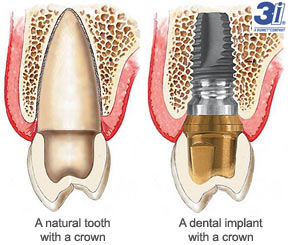Our Services Dental Implants
The Most Natural Replacement for Missing Teeth
 Missing a tooth or teeth can be demoralizing and embarrassing. Fortunately, with modern technology it is possible to restore your smile and confidence with dental implants.
Missing a tooth or teeth can be demoralizing and embarrassing. Fortunately, with modern technology it is possible to restore your smile and confidence with dental implants.
Not only can dental implants replace missing teeth, they also help to maintain your jawbone in much the same way as your natural tooth roots. This leads to less bone loss and preserves a younger facial appearance.
Replacing a Single Missing Tooth
 While there are several different options to replace a missing tooth, dental implants are the most natural. They are fixed and do not get taken in and out of your mouth, they can be flossed and cleaned like a normal tooth, and they do not require alterations to adjacent teeth.
While there are several different options to replace a missing tooth, dental implants are the most natural. They are fixed and do not get taken in and out of your mouth, they can be flossed and cleaned like a normal tooth, and they do not require alterations to adjacent teeth.
A natural tooth is anchored to the jawbone by its root. Tooth roots attach firmly to the jawbone through ligaments and keep your teeth stable and your bone levels healthy. Traditionally, if you replaced a missing tooth, the teeth on either side of the space would be cut down and crowned, and a fake tooth would be attached to, and supported by, those crowns. If the teeth adjacent to this space are healthy, Dr. Hendrix strongly recommends against this treatment option. He has a conservative approach to dentistry and attempts to maintain as much healthy tooth structure as possible.
Benefits of a Single ImplantDental implants are the modern alternative. Instead of cutting down two perfectly healthy teeth to be used as the support for the fake tooth, a dental implant (dental post, or artificial root) is placed into the jawbone to replace your missing tooth root. The implant becomes solidly fixed to your jaw as the bone heals. After sufficient time has elapsed for the area to heal and for the implant to fully integrate with the bone (typically 2-6 months), a crown is placed onto this artificial tooth root. The result is an artificial tooth that looks, feels and functions remarkably like your natural teeth.
Quite simply, dental implants are the most natural replacement for missing teeth.
Replacing Several Missing Teeth
 Traditionally, long spans of missing teeth would have to be replaced with a removable partial denture. In addition, the only option for replacing all of the teeth in an arch was a complete denture that relied completely on the gums for support and stability.
Traditionally, long spans of missing teeth would have to be replaced with a removable partial denture. In addition, the only option for replacing all of the teeth in an arch was a complete denture that relied completely on the gums for support and stability.
All removable dentures should be taken out of the mouth and cleaned, and it is not recommended that you sleep in these dentures. During the day, they can look unnatural and rub painfully. Removable dentures may make it difficult or impossible to eat certain foods and can have a significant negative impact on the quality of the wearer's life.
Benefits of an Implant Secured DentureDental implants can now be used to anchor partial and full dentures. This prevents the slipping, irritation, and pain associated with “floating” dentures. Dental implants also help eliminate the need for denture adhesives. This allows you to enjoy eating the foods you previously avoided and can restore the confidence that is often lost with traditional dentures. With dental implants, your dentures can be "implant retained" or "implant supported" and so be firmly anchored to the jawbone, causing them to feel much more like natural teeth.
In addition to removable dentures, dental implants can be used to anchor an appliance that replaces all of the teeth in an arch, but is fixed and not designed to be removed. In certain patients the results can be very esthetic and can function even more naturally than removable implant supported dentures.
Click here to learn more about Implant Supported Dentures >>
Natural tooth roots and dental implants are fixed firmly in your jawbone. When you chew, these tooth roots and implants stimulate the jawbone and prevent it from shrinking. You may have seen a person who looked prematurely old because their jawbone had shrunk after wearing floating dentures. Dental implants help preserve your jawbone and appearance.
The Success Rate of Dental Implants
After their healing period, the success rate of dental implants is between 94% and 98%. If you are a non-smoker with good oral hygiene, the percentage is closer to 98%.
Does the Procedure Hurt?
The discomfort involved with receiving a dental implant is minor. It is often done under local anesthesia and patients generally experience little discomfort after the procedure.
How Long Will Dental Implants Last?
Dental implants become fixed to the jawbone. With good oral hygiene and regular cleanings, dental implants should last a lifetime. In contrast, the average life span of a traditional fixed bridge is between 10-15 years.
Bone Regeneration
A critical question in determining if an implant can be placed is, “Is there enough bone to support the implant?” Fortunately, advanced bone regeneration techniques now make it possible to place many more implants than ever before.
Am I a Candidate for Dental Implants?
Dental implant treatment begins with an evaluation to determine if you are a good candidate for this procedure. If you are interested in dental implants, please contact Dr. Hendrix for an evaluation.
For More Information
The following site will provide you with more information on dental implants:
- American Academy of Periodontology Article:
Dental Implants: Teeth That Look and Feel Like Your Own




